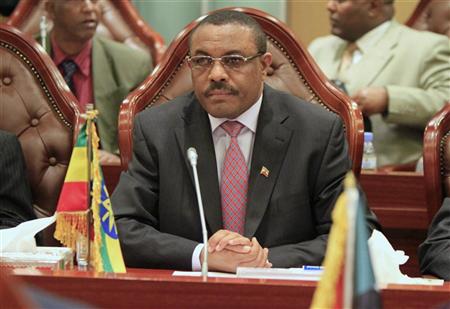Ethiopia’s new leader keen for face-to-face talks with Eritrean president
By Tesfa-Alem Tekle
December 6, 2012 (ADDIS ABABA) – Ethiopia’s newly elected prime minister, Hailemariam Desalegn, on Wednesday affirmed that he is willing to hold direct talks with Eritrea on the long-standing dead-lock over border dispute.

“If you ask me, ‘Do you want to go to Asmara and sit down and negotiate with Isaias Afeworki?’ Then, I will say ‘yes'”, Hailemariam said, raising hopes of new peace talks between the two East African nations.
Last month South Sudan said that would work to mediate between Ethiopia and Eritrea over their border row.
South Sudan’s minister for cabinet affairs, Deng Alor, then said that both Addis Ababa and Asmara have given the green light to come for peace talks and the negotiation talks could start as of November.
When asked if the new approach towards Eritrea was something that came under the new post-Zenawi leadership, Desalegn stated that the decision to deal with Asmara was in line with the policy laid out by the late Zenawi.
“My predecessor Meles Zenawi had asked for more than 50 times even to go to Asmara and negotiate with Mister Isaias Afwerki,” he said.
Desalegn, who assumed power shortly after longtime ruler Meles Zenawi died in August, is seen as a more moderate figure and if he managed to hold talks with the Eritrean leader then he will be the first Ethiopian leader to hold direct talks with Afeworki since the two countries ended their border war in 2000.
Desalegn further said that his government’s top priority is to fight poverty, to have regional integration and, “if we two [Ethiopian and Eritrea] do that, it will be much more productive.”
Eritrea gained independence from Ethiopia in 1993, after a 30-year rebellion. They fought a border war between 2000 and 2002 that killed over 70,000 people.
Earlier this year, tensions between the two neighbours escalated, mounting fears of renewed conflict, after the Ethiopian army carried out cross-border attacks on military camps inside Eritrea. This was in response to the killing and abduction of foreign tourists in January 2012 in Ethiopia’s remote Afar region by rebels allegedly backed by Eritrea.
The cross-border attacks by Ethiopian troops was Addis Ababa’s first and official military incursion since the two East African nations ended the bitter war in 2000 over the disputed town of Badme, which had been attributed to Eritrea by a UN border committee.
However, the flashpoint remains under the control of Ethiopia, which seeks further negotiations.
Ethiopia and Eritrea frequently trade accusations of backing one an others rebel groups to destabilise one the other.
(ST)
